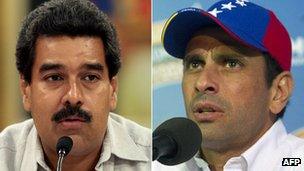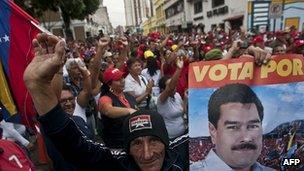US holds back recognition for Venezuela's Nicolas Maduro
- Published

President-elect Nicolas Maduro, left, is rejecting Henrique Capriles's calls for a recount
The US government is refusing to recognise Venezuela's President-elect Nicolas Maduro's victory in disputed elections in Venezuela.
Secretary of State John Kerry said the US was not yet ready to validate the results of Sunday's poll.
Mr Maduro's narrow victory has been challenged by the opposition leader, Henrique Capriles.
Mr Capriles is insisting on a vote-by-vote recount and has now submitted a formal request for one.
However, the National Electoral Council in Venezuela has so far refused to order one, and the Supreme Court said on Wednesday that there was no legal basis for it.
The Union of South American Nations (Unasur) has called an emergency meeting for Thursday to discuss the situation in Venezuela.
Unasur members Argentina, Bolivia, Brazil, Colombia and Peru have already recognised the election results.
Washington has not, and Mr Kerry on Wednesday told members of the US House Foreign Affairs Committee that "if there are huge irregularities we are going to have serious questions about the viability of that government".
Mr Maduro responded by accusing Washington of interfering in Venezuela's internal affairs.
He insisted: "We don't care about your recognition.
"We have chosen to be free, and we are going to be free with or without you."
Anti-US card
He added: "The US intervention in Venezuela in recent months, and particularly during the election campaign, has been brutal, vulgar."
The official count indicates Mr Maduro won 50.8% of votes to Mr Capriles's 49.0%

Supporters of both men have taken to the streets in protest
Analysts say there is nothing new in Venezuela's official rhetoric against the United States.
The late President Hugo Chavez frequently criticised what he called US imperialism.
His chosen successor, Mr Maduro, appears to be following in his footsteps.
Shortly after the death of Mr Chavez, Venezuelan officials said they would set up an inquiry to investigate suspicions that he had been murdered by foreign agencies.
Oil Minister Rafael Ramirez told the BBC that the United States and Israel were to blame for Mr Chavez's death.
For his part, Mr Maduro said that one day a scientific commission would prove that Mr Chavez's cancer had been "injected by imperialist forces".
He has also accused the US government of orchestrating and funding the post-election protests in co-ordination with Venezuela's opposition whom he describes as the bourgeoisie, the oligarchs.
Venezuela and the United States have not had ambassadors in each other's capitals since 2010.
- Published17 April 2013
- Published15 April 2013
- Published12 March 2013
- Published11 March 2013